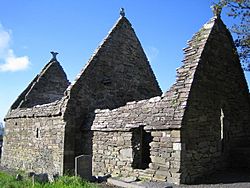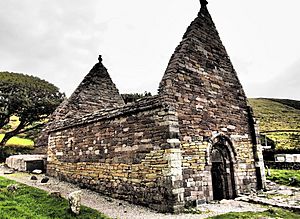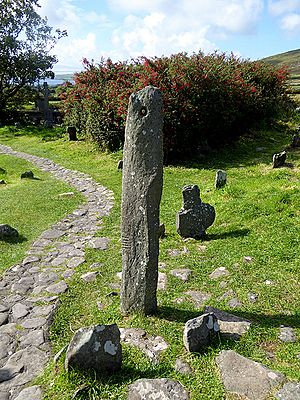Kilmalkedar facts for kids
| Cill Maoilchéadair | |

Church
|
|
| Monastery information | |
|---|---|
| Other names | Cell-maeilchetair |
| Established | early 7th century AD |
| Disestablished | 12th century |
| Diocese | Ardfert and Aghadoe |
| People | |
| Founder(s) | Saint Maolcethair |
| Architecture | |
| Status | Inactive |
| Style | Celtic Christianity, Romanesque |
| Site | |
| Location | Kilmalkedar, Dingle Peninsula, County Kerry |
| Coordinates | 52°11′05″N 10°20′10″W / 52.184775°N 10.33623°W |
| Visible remains | stone church, cross, oratory, holy well |
| Public access | yes |
| Official name | Kilmalkedar Early Medieval Ecclesiastical Site |
| Reference no. | 65 |
Kilmalkedar is an ancient church site and a National Monument in County Kerry, Ireland. It is a very old place with a rich history, showing how people lived and worshipped many centuries ago.
Where is Kilmalkedar?
Kilmalkedar is found on the beautiful Dingle Peninsula. It is about 4.8 kilometers (3 miles) east of Ballyferriter. It is also about 6.7 kilometers (4.2 miles) northwest of Dingle town.
The Story of Kilmalkedar
Kilmalkedar has a long and interesting past. People often connect it with Saint Brendan, a famous Irish saint who lived around 484 to 577 AD. However, it is also linked to a local saint named Maolcethair, who died in 636 AD.
The main church building you see today was built in the mid-12th century. The front part of the church, called the chancel, was made longer around the year 1200.
This site was a common meeting place for pilgrims. Pilgrims are people who travel for religious reasons. They would follow a path called the Saint's Road (Casán na Naomh) northeast to Mount Brandon.
Some old traditions still happen here. For example, locals sometimes walk around the site nine times clockwise on Easter Sunday. People also used to bore holes in standing stones. These customs might be leftovers from even older beliefs. Kilmalkedar might have been a special religious place long before Christianity arrived in Ireland.
Exploring the Buildings
The church at Kilmalkedar looks a bit like Cormac's Chapel. That chapel was built on the Rock of Cashel between 1127 and 1134. The main part of the church, called the nave, is about 8.28 meters (27.2 feet) long and 9.4 meters (30.8 feet) wide. It has strong side walls and steep, pointy roofs.
The chancel, which is the area near the altar, is about 5.72 meters (18.8 feet) long and 5.1 meters (16.7 feet) wide on the outside. The doorway is very special. It shows a unique Irish-Romanesque style of building.
There is a hole in the east wall of the chancel. It is called "the eye of the needle." Legend says that if you can fit through this hole, you are sure to go to heaven!
Besides the church, there are other very old remains. These include a small building with a special arched roof, which might have been a tiny home for a monk. There is also an alphabet stone and an Ogham stone. An Ogham stone has an ancient Irish writing system carved into it.
You can also find a sundial, a stone cross, and some special stones with hollows called bullauns. One of these bullauns is linked to a mythical cow named Glas Gaibhnenn.
The alphabet stone has the word "DNI" (which means "of the Lord") carved on it. It also shows the Latin alphabet in a special old writing style. This carving was made around 550–600 AD.
The Ogham stone (CIIC 187) has an inscription that reads "Name of Máel-Inbher son of Broccán." This stone dates back to about 600 AD.
See also
 In Spanish: Iglesia de Kilmalkedar para niños
In Spanish: Iglesia de Kilmalkedar para niños
 | Frances Mary Albrier |
 | Whitney Young |
 | Muhammad Ali |













